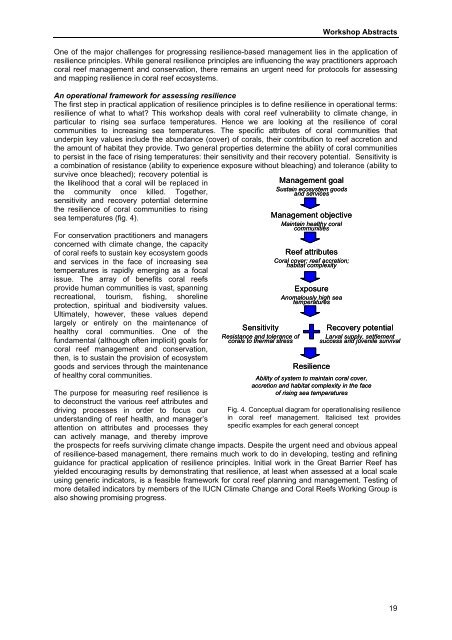Obura2009-IUCN Congress report - Resilience sessions
Obura2009-IUCN Congress report - Resilience sessions.pdf
Obura2009-IUCN Congress report - Resilience sessions.pdf
You also want an ePaper? Increase the reach of your titles
YUMPU automatically turns print PDFs into web optimized ePapers that Google loves.
Workshop Abstracts<br />
One of the major challenges for progressing resilience-based management lies in the application of<br />
resilience principles. While general resilience principles are influencing the way practitioners approach<br />
coral reef management and conservation, there remains an urgent need for protocols for assessing<br />
and mapping resilience in coral reef ecosystems.<br />
An operational framework for assessing resilience<br />
The first step in practical application of resilience principles is to define resilience in operational terms:<br />
resilience of what to what? This workshop deals with coral reef vulnerability to climate change, in<br />
particular to rising sea surface temperatures. Hence we are looking at the resilience of coral<br />
communities to increasing sea temperatures. The specific attributes of coral communities that<br />
underpin key values include the abundance (cover) of corals, their contribution to reef accretion and<br />
the amount of habitat they provide. Two general properties determine the ability of coral communities<br />
to persist in the face of rising temperatures: their sensitivity and their recovery potential. Sensitivity is<br />
a combination of resistance (ability to experience exposure without bleaching) and tolerance (ability to<br />
survive once bleached); recovery potential is<br />
the likelihood that a coral will be replaced in<br />
Management goal<br />
the community once killed. Together,<br />
Sustain ecosystem goods<br />
and services<br />
sensitivity and recovery potential determine<br />
the resilience of coral communities to rising<br />
sea temperatures (fig. 4).<br />
Management objective<br />
Maintain healthy coral<br />
communities<br />
For conservation practitioners and managers<br />
concerned with climate change, the capacity<br />
of coral reefs to sustain key ecosystem goods<br />
Reef attributes<br />
and services in the face of increasing sea<br />
Coral cover; reef accretion;<br />
habitat complexity<br />
temperatures is rapidly emerging as a focal<br />
issue. The array of benefits coral reefs<br />
provide human communities is vast, spanning<br />
Exposure<br />
recreational, tourism, fishing, shoreline<br />
Anomalously high sea<br />
temperatures<br />
protection, spiritual and biodiversity values.<br />
Ultimately, however, these values depend<br />
largely or entirely on the maintenance of<br />
Sensitivity<br />
Recovery potential<br />
healthy coral communities. One of the<br />
Resistance and tolerance of<br />
Larval supply, settlement<br />
fundamental (although often implicit) goals for<br />
corals to thermal stress<br />
success and juvenile survival<br />
coral reef management and conservation,<br />
then, is to sustain the provision of ecosystem<br />
goods and services through the maintenance<br />
<strong>Resilience</strong><br />
of healthy coral communities.<br />
Ability of system to maintain coral cover,<br />
The purpose for measuring reef resilience is<br />
to deconstruct the various reef attributes and<br />
driving processes in order to focus our<br />
understanding of reef health, and manager’s<br />
attention on attributes and processes they<br />
can actively manage, and thereby improve<br />
accretion and habitat complexity in the face<br />
of rising sea temperatures<br />
Fig. 4. Conceptual diagram for operationalising resilience<br />
in coral reef management. Italicised text provides<br />
specific examples for each general concept<br />
the prospects for reefs surviving climate change impacts. Despite the urgent need and obvious appeal<br />
of resilience-based management, there remains much work to do in developing, testing and refining<br />
guidance for practical application of resilience principles. Initial work in the Great Barrier Reef has<br />
yielded encouraging results by demonstrating that resilience, at least when assessed at a local scale<br />
using generic indicators, is a feasible framework for coral reef planning and management. Testing of<br />
more detailed indicators by members of the <strong>IUCN</strong> Climate Change and Coral Reefs Working Group is<br />
also showing promising progress.<br />
19


















